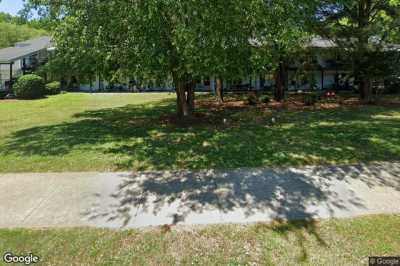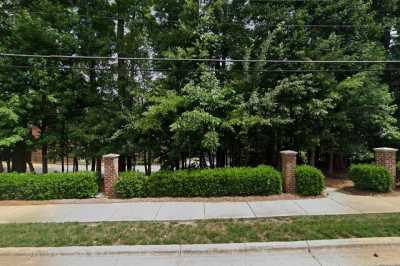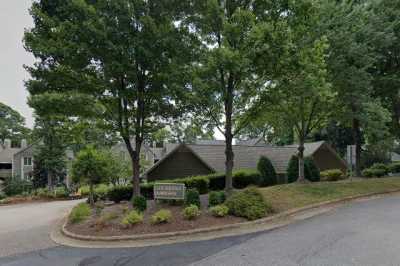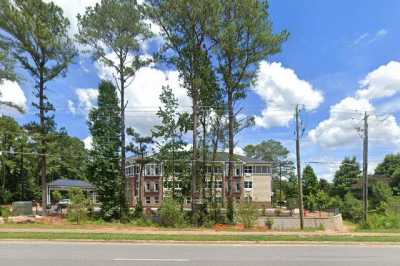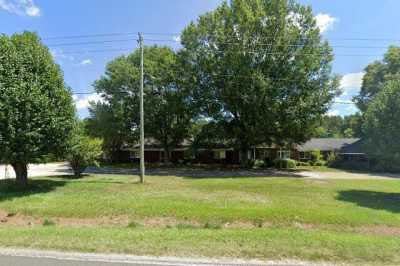
10 Best Nursing Homes in Raleigh, NC
Raleigh, North Carolina, has a variety of excellent senior care facilities. As the capital of North Carolina, Raleigh is known for its enriching museums and abundance of parks. Since 2022, Raleigh’s population has grown by 2.4%, making it one of the fastest growing cities in America. Seniors, families, and professionals are all drawn to Raleigh for its outdoor activities, family-friendliness, and high quality of life.
Of the nearly 480,000 people living in Raleigh, about 12% are over 65. Seniors living in Raleigh tend to be from the area, or have recently followed family. Raleigh has exceptional health care facilities, low crime, and mild weather, which make the City of Oaks an excellent choice for seniors. Seniors looking for a nursing home will find many wonderful options here.
The term “nursing home” is sometimes used as a general term for all senior living. Nursing homes are actually specialized facilities where seniors can receive round-the-clock medical care. While A Place for Mom doesn’t partner with traditional, stand-alone nursing homes, about 35% of Raleigh’s assisted living and memory care facilities provide some short-term skilled nursing care. These skilled nursing wings are a good fit for seniors who need short-term rehabilitation. Seniors who don’t need specialized medical care may be a better fit for Raleigh’s assisted living or memory care facilities.
This guide offers an in-depth look at senior care facilities in Raleigh. We use our proprietary data to uncover the cost of senior care, how to pay, and explain local laws and regulations. We also discuss senior-friendly transportation, health care, and activities in and around Raleigh.
Nursing Homes Facilities near Raleigh, NC
Our free advisors can help
- Compare local facilities
- Determine care type
- Schedule tours
- Evaluate pricing
Our methodology
How we rank order the Raleigh community options above
We developed a proprietary recommendation system that orders Raleigh community options based on factors we know are important to seniors and their families:
- Proximity to your search location
- Availability of recent, high-quality reviews
- The amount of detailed community information available
Where we source our information
14,000+ communities
We collect proprietary data from our network of 14,000+ senior living communities in the U.S., with regular refreshes of data and information
350,000+ reviews
We have 387,000+ reviews from senior living residents and family members that provide first-hand accounts about senior living communities
- Costs of nursing homes in Raleigh
- What families are saying about nursing homes in Raleigh
- How people pay for a nursing home in Raleigh
- North Carolina laws and regulations for nursing homes
- What to expect from nursing homes in Raleigh
- Raleigh nursing homes services and amenities
- Explore senior care with confidence
- Unfamiliar with Raleigh? Highlights for seniors
Costs of nursing homes in Raleigh
Skilled nursing facilities, or nursing homes, are more expensive than other senior care facilities because they require more staffing, training, and equipment.
Nursing homes in Raleigh
The average cost of a nursing home is $7,600 per month.[04] This monthly fee typically includes the following:
- Rent for a private or a shared room
- Housekeeping and utilities
- Daily meals and snacks
- Medical and rehabilitative care
- 24-hour supervision
- Planned activities and entertainment
Cost of assisted living and memory care in Raleigh
Raleigh’s assisted living and memory care facilities are considerably more affordable than skilled nursing care. If your loved one doesn’t need long-term skilled nursing care, consider Raleigh’s other senior care facilities.
Assisted living in Raleigh
The average cost of assisted living is $6,300 per month.[03] The monthly fee typically includes the following:
- Rent for an apartment, suite, or room
- Utilities and housekeeping
- Daily meals and snacks
- Personal care, including grooming and mobility
- Regular activities and classes
Memory care in Raleigh
The average cost of memory care is $6,325 per month.[03] This monthly fee typically includes the following:
- Assistance with daily activities
- Increased supervision
- Dementia-specific design features
- Memory care training for caregivers
Cost of living in Raleigh
The overall cost of living in Raleigh is 3% lower than the national average. The cost is also 2% higher than the average in North Carolina, making Raleigh a moderately affordable place for most Americans. Housing costs have risen by 1.8% since 2022, driven by Raleigh’s booming technology and research economy.[05] Raleigh may be one of the most popular places to move in North Carolina, and senior living costs are rising with its popularity.
Senior living in Raleigh is slightly more expensive than other North Carolina cities, with the exception of Asheville. However, seniors are often willing to pay more for access to Raleigh’s exceptional medical facilities, green spaces, and senior living options.
Retirees will find that North Carolina is somewhat tax-friendly for seniors. Unlike most other states, North Carolina doesn’t tax retirement benefits from Social Security. As of 2023, other forms of income are taxed at a flat rate of 4.75%.[06]
Average monthly cost of Nursing Homes in Raleigh, NC vs. nearby cities
Average monthly cost of Nursing Homes in Raleigh, NC vs. the state and national average
Average monthly cost of Nursing Homes in Raleigh vs. other types of senior living
Median monthly costs of Nursing Homes in Raleigh, NC by room type
Average cost of Nursing Homes in Raleigh over time
What families are saying about nursing homes in Raleigh
Recent reviews for nursing homes in Raleigh
Phoenix Assisted Care in Cary, NC
Spring Arbor of Raleigh
HeartFields at Cary
How people pay for a nursing home in Raleigh
How you decide to pay for senior care should be based on your personal financial situation. Most families use a combination of personal funds, such as retirement accounts or income, and public aid programs, such as veterans benefits, Medicaid, and Medicare.
Read on to learn some tried-and-true methods to keep your ideal senior care facility within reach.
Most families need to use some private funds to cover the cost of skilled nursing care. Private pay methods include anything from investment accounts, retirement savings plans, and long-term and life care insurance. Use these articles to learn more about how to leverage your private assets to pay for long-term care.
Number of veterans who live in Raleigh
About 40% of Raleigh veterans are 65+
Using veterans benefits to pay for a nursing home or senior care community
You or your loved one may be able to pay for some of your long-term senior care costs using veterans benefits. The U.S. Department of Veterans Affairs (VA) offers multiple benefits to assist veterans and their families. Each benefit has different eligibility requirements, so consider speaking with a veterans benefits counselor to help you with your application. One benefit to ask about is the Aid and Attendance benefit, which can be used to pay for anything that improves the veteran’s quality of life, including senior living expenses.
Eligibility for veterans benefits
Because VA benefits can be difficult to understand and apply for, we recommend contacting your local veterans service organization (VSO). VSOs are nonprofits often vetted by the VA. They often employ veterans benefits counselors who can help you or your loved one apply for benefits or appeal denied benefits. The options below include both the local North Carolina VA office and other nonprofit organizations that can offer some veterans benefits counseling.
Veterans benefits counseling in Raleigh
- North Carolina Department of Military and Veterans Affairs. The North Carolina Department of Military and Veterans Affairs provides benefits counseling. Benefits counseling comes at no cost to veterans or their families. You can sign up for benefits counseling through the department’s website. Counseling services can be conducted remotely or in person at the local Raleigh office.
- Disabled American Veterans (DAV). DAV is a nonprofit that isn’t affiliated with the VA, but it offers high-quality and compassionate benefits counseling through its local offices. DAV services are reserved for American veterans with disabilities, and there is usually one office per city.
- Veterans of Foreign Wars (VFW). VFW is a nonprofit that isn’t associated with the VA. It offers some benefits counseling to veterans through their local chapters. They can offer suggestions during the application process, and there is usually more than one chapter in a city. Be sure to look for the chapter
Resources for Raleigh veterans
North Carolina Department of Military and Veterans Affairs
413 North Salisbury St.
Raleigh, NC 27603
Phone: 844-624-8387
Disabled American Veterans (DAV) North Carolina
5623 Duraleigh Road
Raleigh, NC 27612-2700
Phone: 919-833-5567
Medicaid may cover nursing home care. Medicaid provides health insurance for low-income individuals, is administered by the state government, and funded by both the state and federal governments. In North Carolina, the Medicaid program is called NC Medicaid and is operated by the Division of Health Service Regulations through the NC Department of Health and Human Services (NCDHHS). Like all health insurance plans, NC Medicaid primarily covers medical care, although some state programs cover some long-term senior care services.
Does NC Medicaid cover nursing homes?
Yes, NC Medicaid covers most expenses at Medicaid-approved nursing homes. NC Medicaid typically covers the following in Raleigh’s nursing homes:
- Rent and meals
- All skilled nursing care
- Rehabilitative therapies
- 24-hour supervision
Nursing homes typically offer extensive medical care services, including:
- Respiratory therapy
- Dialysis
- Medication management
- Injections
- Wound care
Does NC Medicaid cover assisted living or memory care?
No, NC Medicaid doesn’t cover room and board at private assisted living or memory care communities. However, medically necessary care services may be covered. For instance, if a Medicaid-eligible senior receives medically necessary skilled nursing care through a Medicaid-affiliated home health care agency, the care may be covered by Medicaid. Usually, these seniors must go through one of the following programs to get care services covered at their home or senior community:
- Program of All-Inclusive Care for the Elderly (PACE). This program combines access to Medicare and Medicaid to help seniors receive transportation and skilled nursing care.
- Personal Care Services (PCS). This program helps fund personal care, such as assistance with daily activities like bathing and grooming, for seniors who reside in an assisted living facility.
- Community Alternatives Program for Disabled Adults (CAP/DA). This program is for seniors with skilled nursing needs who want to continue living in their senior care facility, instead of moving to a nursing home.
Who is eligible for NC Medicaid?
Seniors are eligible for NC Medicaid if they meet the following criteria:
- Meets income limits. An individual can make no more than $1,215 a month to qualify for NC Medicaid, and a couple can make no more than $1,644 a month.[08] However, you may be able to receive some Medicaid benefits even if your income exceeds the limit. Consider contacting the Wake County Department of Social Services to help determine your eligibility.
-
Needs skilled nursing care. An individual’s physician determines whether or not there is a medical need for skilled nursing care. Some qualifying conditions include a need for respiratory services, dialysis, or a need for 24-hour supervision.
Eligible seniors who wish to use NC Medicaid to pay for their skilled nursing care will need to receive care from a skilled nursing facility or agency that accepts Medicaid. Be sure to ask your senior care facility if they do before attempting to cover expenses with Medicaid.
Raleigh resident Medicaid resources
North Carolina Medicaid Contacts
2501 Mail Service Center
Raleigh, NC 27699
Phone: 888-245-0179
Email: Medicaid.Transformation@dhhs.nc.gov
Medicare is a federal health insurance program for individuals over 65 who have paid their Medicare taxes or are married to someone who has paid their Medicare taxes. Medicare only covers medical services, which means Medicare does cover some nursing home expenses. Read on to learn what aspects of skilled nursing care Medicare covers.
What does Medicare cover?
Medicare covers short-term and medically necessary expenses. A physician and a Medicare representative must both agree that the expense meets both of these criteria before submitting it for Medicare coverage. Medicare coverage is individualized. What’s considered medically necessary for one person may not be for another.
Here are examples of what Medicare often covers:
- Inpatient hospital stays for emergency procedures or illnesses
- Wheelchairs
- Oxygen equipment and accessories
- Short-term stays (under 30 days) at rehabilitative facilities following procedures or illnesses
Here are examples of what Medicare may not cover:
- Indefinite or long-term stays at a rehabilitative or skilled nursing facilities
- Nonmedical care, such as personal care or memory care
Medicare Savings Programs in Raleigh
Like all health insurance programs, seniors are expected to pay for some medical care costs under Medicare through copayments, premiums, coinsurance, and prescriptions. Seniors can find help paying for these additional costs with one of North Carolina’s Medicare Savings Programs.
The following contacts can help you identify the right Medicare Savings Program for you:
- State Health Insurance Information Program (SHIIP). SHIIP is designed to help Medicare beneficiaries and their families. Contact a SHIIP counselor to help identify the right program based on your needs.
- Program of All-Inclusive Care for the Elderly (PACE). The PACE program offers comprehensive help with care needs, such as adult day health care, socialization, and meal services. Learn more about the local Raleigh program on the PACE website.
- The North Carolina Long-Term Care Ombudsman. This official can answer questions about long-term care, and document complaints about your Medicare coverage.
- Elder law attorneys. If you need help beyond what these agencies can provide, consider reaching out to a local, North Carolina-based attorney specializing in elder law.
Raleigh resident Medicare resources
North Carolina laws and regulations for nursing homes
Raleigh’s senior care facilities provide professional and compassionate care to local seniors. The North Carolina Division of Health Service Regulation (DHSR) regulates and licenses senior living facilities in North Carolina, including nursing homes. To maintain the high quality of Raleigh’s senior care facilities, the DHSR inspects all facilities annually. Inspections check how well the facilities follow federal and state guidelines for safety, ethics, and quality of life.
Find inspections and file a complaint
You can find all inspection results on the North Carolina Adult Care Licensure Section. You can also find a list of every facility that has been penalized by the DHSR using the Listings of Facilities with Penalties. If needed, you can file a complaint about your loved one’s senior care facility directly to the North Carolina DHSR or contact your local ombudsman office.
Regulations for skilled nursing facilities in North Carolina
All nursing homes in Raleigh follow North Carolina’s DHSR rules and regulations for nursing homes. Regulations are put in place to ensure that nursing homes offer ethical and safe care to its residents, and keep the quality of life in their facilities high. Some of the most important rules for nursing homes in Raleigh include the following:
- Nursing homes must allow residents their autonomy, permitting them to choose their own health care provider and informing them of any changes to care or fees.
- Residents and their families must be allowed to make complaints without fear of retaliation.
- Nursing homes can only accept residents who require skilled nursing care.
- All nursing homes must have a cardiopulmonary resuscitation (CPR) policy.
- Physicians must meet with each resident at least every 60 days.
- Nursing homes must have accessible outdoor areas for residents.
- Bedrooms must have at least one window and a closet or wardrobe.
- Nursing homes should offer regular activities to support resident’s interests and needs.
- Meals must be planned two weeks in advance and meet resident’s individual dietary needs.
Regulations for assisted living and memory care facilities in Raleigh
Like nursing homes, assisted living and memory care facilities are regulated by the DHSR. You can find all regulations for assisted living and memory care facilities on the North Carolina Rules and Statutes for Adult Care Homes. Some of the most important regulations for these senior care facilities include the following:
- Senior living facilities should respect residents’ autonomy and dignity by allowing them to make their own health care decisions.
- Facilities should allow residents and families to make complaints without fear of retaliation.
- Each resident should be given a care plan upon moving into a facility, and the plan should be updated regularly.
- Residents and families must be updated about any changes to care or fees.
- Assisted living and memory care facilities can’t accept residents who need skilled nursing care.
North Carolina Department of Health contact information
North Carolina Department of Health
101 Blair Dr.
Raleigh, NC 27603
Phone: 919-855-4800
COVID-19 regulations for Raleigh nursing homes
The North Carolina state government doesn’t currently enforce any COVID-19 policies in senior living facilities. The North Carolina Department of Health offers COVID-19 mitigation guidance and training for long-term care facilities, including nursing homes, assisted living, and memory care facilities. Senior care facilities are expected to follow guidance from the CDC about handling the spread of COVID-19.
Common respiratory diseases, like COVID-19, the flu, and RSV, are tracked on the North Carolina Department of Health and Human Service’s Respiratory Virus Summary Dashboard. You can find how quickly these diseases are spreading in your area.
Masking. Senior care facilities may ask their staff members to mask to prevent the spread of disease.
Facility cleanliness. Senior care facilities maintain excellent hygiene standards in accordance with the rules and regulations from the North Carolina Department of Health.
Social distancing. Loved ones are allowed to visit senior care facilities at any time.
Quarantining. Senior care facilities often have quarantine wings for patients with respiratory diseases, but aren’t mandated to have them.
What to expect from nursing homes in Raleigh
Raleigh, North Carolina, is one of the fastest-growing cities in the United States, and it remains popular among seniors. Since 2022, Raleigh’s population of nearly 480,000 has grown by 2.4%, and about 12% of the city’s population is over 65.[01,02] Seniors value Raleigh’s temperate climate, exceptional health care facilities, and public parks and museums. Known as the City of Oaks with its 200+ city parks, Raleigh combines the best of mid-sized city living and the outdoors. Raleigh’s reputation for bringing in young professionals and families means many seniors moving to Raleigh for senior living already have family nearby.
Compared to the rest of the state, Raleigh’s senior care facilities are some of the best. Excellent staffing ratios, high safety standards, and updated facilities increase the quality of life for residents. Seniors in need of 24-hour supervision and skilled nursing care may need to find a local nursing facility. If you or your loved one simply need help with daily activities or dementia-specific care, consider Raleigh’s assisted living or memory care facilities instead.
Learn more about Raleigh’s nursing homes, assisted living, and memory care facilities below to make an informed decision for yourself or your loved one.
Nursing homes in Raleigh
Nursing homes provide skilled nursing care and round-the-clock supervision for seniors who need short-term rehabilitative care after a procedure or an illness, or long-term care for seniors who need skilled nursing for the rest of their lives. A Place for Mom doesn’t partner with any traditional, stand-alone nursing homes. However, around 35% of our partnering assisted living and memory care facilities in Raleigh offer some short-term skilled nursing care.[03] These “skilled nursing wings” follow the same laws and regulations as traditional nursing homes.
Assisted living and memory care in Raleigh
For seniors who require nonmedical care, assisted living or memory care facilities can fulfill that need. In Raleigh, assisted living and memory care facilities are almost always offered on the same campus or in the same building. Facilities tend to be mid-sized, with between 25 and 70 residents. Most of these facilities are in quiet suburban areas less than 15 minutes from the nearest hospital. Updated interiors and well-kept outdoor areas are common as well. Many facilities have extensive amenities, such as indoor pools, exercise rooms, arts and crafts centers, and walking trails.
About 39% of Raleigh’s assisted living and memory care facilities are residential care homes.[03] These facilities offer the same type of care as larger assisted living and memory care communities, but are similar to residential homes and house between three and seven residents. While these facilities follow the same rules and regulations, they tend to be more affordable.
Raleigh nursing homes services and amenities
Availability of select care services in Raleigh nursing homes
Availability of select dementia care services in Raleigh nursing homes
Availability of select dietary accommodations in Raleigh nursing homes
Availability of select dining options in Raleigh nursing homes
Availability of select programs and activities in Raleigh nursing homes
Explore senior care with confidence
Know where to start.
Identify the right care for your loved one with our free assessment.

See what you can afford.
Understand cost and payment for long-term care based on your loved one's needs.

Find top facilities for you.
Free, personalized guidance from our Senior Living Advisors can help you narrow your search.

Tour your favorite facilities.
Our free touring checklist can help you choose the right community.
Unfamiliar with Raleigh? Highlights for seniors
Number of seniors over the age of 65 currently living in Raleigh
Percentage of seniors 65 and older within the Raleigh population
Median annual income for Raleigh seniors 65 and older
Health care for seniors in Raleigh
As part of the Research Triangle, Raleigh has exceptional health care facilities that are within a twenty-minute drive from most partnering senior care facilities. These hospitals all offer geriatric care, inpatient care, and most specialties.

Duke University Hospital offers a full range of primary and specialty care, including geriatrics, oncology, and ophthalmology. Considered one of the best hospitals in the nation, Duke University Hospital is a teaching institution where Duke University medical students and residents receive training. The hospital is located in Durham and patients have access to cutting-edge technology and treatments. It’s approximately 30 minutes from Raleigh’s city center and serves the entire Raleigh-Durham area.

The UNC Hospital System has eight different locations across North Carolina. The Raleigh location is called UNC REX Healthcare, and was named a five-star Hospital by the Centers for Medicaid and Medicare Services (CMS). It offers a full scope of primary and specialty care, including geriatrics, general surgery, and urgent care.

This private, nonprofit hospital system has three locations across North Carolina. The Raleigh location offers a range of primary and specialty services, including geriatrics, orthopedic surgery, and rehabilitation care. This hospital uses some of the most updated surgical and imaging technology to give patients the best care.
Transportation for seniors in Raleigh
Seniors living in Raleigh’s nursing homes typically don’t need to worry about transportation around the city, as their needs are often met by the community. Assisted living and memory care residents in Raleigh may or may not want to travel independently depending on their health needs. Most senior care facilities in Raleigh offer complimentary transportation services or transportation for a fee. These services allow residents to attend appointments and events without having to find public transportation or drive their own vehicle.
Families and friends are able to take their loved one out for day trips and vacations. Traffic in Raleigh and throughout the Research Triangle — which encompasses Raleigh, Durham, and Chapel Hill — can be challenging, especially during rush hour.
Activities for seniors in Raleigh
Seniors residing in Raleigh’s nursing homes will find plenty of activities and entertainment in their community. Approximately 61% of Raleigh’s assisted living and memory care facilities employ an activities director, and 100% of Raleigh’s senior care facilities are required by the DHSR to provide regular activities for residents.[03]
Card game nights, movie showings, visiting performers, social hours, exercise classes, and financial literacy courses are common in assisted living facilities. Memory care facilities tailor their activities to the abilities of their residents, often choosing musical games or soothing projects. Many assisted living and memory care facilities also take their residents on outings to local parks and museums.
Parks in Raleigh
Raleigh is known as The City of Oaks, and it certainly lives up to the name. The parks listed below are some of the most senior-friendly, offering groomed trails, wheelchair accessibility, and tranquility.
- Pullen Park. Pulled Park is the centerpiece of Raleigh’s family activities. It’s on 66 acres and has pedal boats, a carousel, and theater performances. Most performances are free, and the park is open all year from dawn to dusk. This dynamic park is filled with a variety of activities for grandchildren, grandparents, and great-grandparents.
- Dorothea Dix Park. As the largest park in Raleigh, Dorothea Dix Park encompasses a sprawling 308 acres in the heart of Raleigh. It offers grass lawns, shaded tree areas with picnic spots, and a beautiful view of the downtown Raleigh skyline. It’s open all year and is free to the public.
- Mordecai Historic Park. Perfect for history lovers, Mordecai Historic Park is actually a neighborhood near downtown Raleigh. Famous for its stately architecture and historical significance, Mordecai Historic Park includes Andrew Johnson’s childhood home and the Mordecai House. You can visit the area on your own, but guided tours are available through the Visitor’s Center. Tours begin most days at 10 a.m. and take place on the hour until 3 p.m. Senior tickets cost $4. Call 919-996-4364 to reserve a tour spot.
- JC Raulston Arboretum at NC State University. The arboretum is part of the North Carolina State University horticulture program and is located near the North Carolina State Fairgrounds. Doubling as a botanical garden, visitors can stroll through the Japanese garden, seasonal flower displays, and education center. Admission is free, and the park is wheelchair accessible.
Cultural activities in Raleigh
The capital of North Carolina offers seniors and their families plenty of opportunities to learn and explore. Whether you choose to spend an afternoon browsing an art collection, learning a new language, or enjoying gourmet cuisine, Raleigh has everything you need.
- North Carolina Museum of Art. The North Carolina Museum of Art boasts an extensive art collection ranging from ancient history to contemporary American art. Set on 164 acres of outdoor areas, both the museum and park are free to the public. Special exhibitions may cost an extra fee, and wheelchairs are available for free to visitors. The museum is open from 10 a.m. to 5 p.m., Wednesday through Sunday.
- Martin Marietta Center for the Performing Arts. Known until recently as the Duke Energy Center, the Martin Marietta for the Performing Arts is home to the North Carolina Symphony and visiting performances. You can find upcoming events on the website and tickets through Ticketmaster. Seniors may receive a discount for individual performances, but there is no senior discount overall. Seniors can find accessible parking and wheelchair access throughout the center.
- Osher Lifelong Learning Institute. Seniors who consider themselves lifelong learners may consider a membership at the Osher Lifelong Learning Institute. Seniors over 50 can become members by paying a $40 annual membership fee. Classes span subjects from economics to cellular biology and Shakespearean drama. The institute also offers field trips and overnight options for active seniors.
- Triangle Restaurant Week. This annual event celebrates the culinary excellence of the Raleigh-Durham-Chapel Hill area. Typically held in the middle of June, Triangle Restaurant Week allows locals to try meals from a wide range of restaurants for a flat rate. While seniors don’t receive a specific discount, participating restaurants offer reasonable rates ranging from $15 to $50.
Frequently Asked Questions
Brookdale Meadowmont, Oak Hill Assisted Living and Spring Arbor of Apex are the top-rated Nursing Homes facilities near Raleigh, NC. These Nursing Homes facilities received the highest rankings based on verified family reviews. See full list of communities.
The average cost of Nursing Homes in Raleigh is $5,781 per month. This cost may vary based on location, amenities, floorplan, level of care and other factors.
References
Macrotrends.net. (2023). Raleigh metro area population 1950-2023.
United States Census Bureau. (2021). Age and sex (S0101): Raleigh city [Data set]. American community survey.
A Place for Mom. (2022). A Place for Mom proprietary data.
Genworth. (2021). Cost of Care Survey.
Rentcafe.com. (2022). Raleigh, NC rental market trends.
North Carolina Department of Revenue. (2023). Tax rate schedules.
United States Census Bureau. (2021). Veteran status (S2101): Raleigh city [Data set]. American community survey.
NC Department of Health and Human Services. (2023). Medicaid eligibility.
United States Census Bureau. (2023). Mean income in the past 12 months (S1902): Raleigh city [Data set]. American community survey.

More questions?
Ask an A Place for Mom local advisor at no cost.
- Hollemans Crossroads, North Carolina
- Duncan, North Carolina
- Whitley Heights, North Carolina
- Holland, North Carolina
- Willow Springs, North Carolina
- Powhatan, North Carolina
- Johnson Crossroads, North Carolina
- Wilson's Mills, North Carolina
- Sandy Plain, North Carolina
- Archer Lodge, North Carolina
- Coats Crossroads, North Carolina
- Flowers, North Carolina
- Butner, North Carolina
- Tysonville, North Carolina
- Glen Forest, North Carolina
- Rhamkatte, North Carolina
- Clegg, North Carolina
- Medfield, North Carolina
- Social Plains, North Carolina
- Glenwood Village, North Carolina

